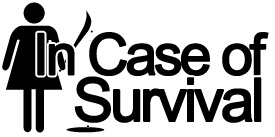A few months ago, I started doing semi-regular apocalypse walks. These are a really good idea, and I thought I was getting super fit. Certainly skil enough to take a job that involves walking for five hours a day.
If you could hear me, you’d hear hollow laughter.
Oh yeah. It turns out that most people assume they are better at stuff than they are. I assumed I was fitter than I was because I could walk for up to 10 miles at a fairly leisurely pace. Of coure, I stopped regularly on those walks, carried very little and generally treated it like a fun excursion. It’s a bit different when you have to walk at speed for five hours, in the sweltering heat, carrying a backpack, and still have to do your job.
So you really need to be aware of this stuff. Unless you are actually a fully trained professional in something, you’re probably not as good at it as you assume.
So what can you do about that?
Learn your (actual) limits:
Don’t assume that you can do something based on limited or no experience of it. Actually go out there and do it – or something as close to it as you can.
If you think you can walk for hours at a decent pace, in all weathers, carrying a backpack, GO AND DO IT. When you have done it, you’ll know how good you are, and whether you need to practice more.
Don’t underestimate how much work it takes:
The things we discuss may seem easy to you – but you have to remember that when you do them you’re CHOOSING to and you have the option to stop at any time. It’s fun to live off the land when you have the option to return to central heating.
online pharmacy
buy apixaban with best prices today in the USA
It’s nice to choose natural childbirth when there are hospitals available to help you out if you get in trouble. If you have no other choice than these things, you might find they become more stressful and dangerous.
Self-Awareness:
Easy to say, hard to do. Effectively, you need to be well, aware of yourself. How you react. Your strengths and weaknesses. And you need to be honest about those things or you’re going to get yourself – and other people – into trouble.
So, how to do it?
As I said, try and experience things for yourself. Measure your acheivements against others – you can’t expect to be as good as an expert, but compare yourself against the average. If you aren’t good in comparison, you’re below average. Simple, yes? Be honest with yourself about this – I know your ego relies on being awesome, but there’s no shame in not being good at something – and you can always get better.
online pharmacy
buy zydena with best prices today in the USA
Of course, the people who always think they’re experts aren’t ever going to understand this is about them. Fortunately, they’re gonna die pretty soon.
Hopefully they won’t take any of us with them.

